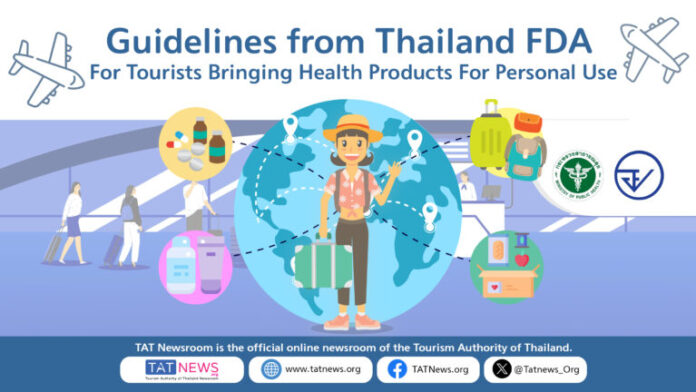The Tourism Authority of Thailand advises travelers to follow FDA guidelines for importing health products to ensure compliance and avoid customs issues, supporting health and safety standards in the country.
Key Points
-
The Tourism Authority of Thailand (TAT) advises travelers to adhere to the Thai FDA’s guidelines on importing personal health products to facilitate smooth customs processes and uphold health standards.
-
Key guidelines include restrictions on the quantity and documentation for medicines (30-day supply), cosmetics (15 items), and medical devices. Food items are limited to 10 kilograms, and importing by mail must follow specific labeling standards.
- Non-compliance with regulations, especially regarding narcotics and unregistered products, can result in penalties. Travelers should check the FDA’s website for resources and ensure all products meet safety standards.
The Tourism Authority of Thailand (TAT) has issued an important advisory urging travelers to adhere to the guidelines set forth by the Thai Food and Drug Administration (FDA) regarding the importation of health products for personal use. This initiative, announced on November 14, 2024, is centered on ensuring compliance with health and safety regulations, thereby facilitating a smooth customs process for visitors entering Thailand with health-related items.
The FDA has delineated specific instructions that cover a wide range of products, including medicines, dietary supplements, cosmetics, and medical devices. Travelers are encouraged to familiarize themselves with these guidelines to mitigate the risk of customs delays or complications when importing these goods, whether they bring them directly or through postal services. Key importation stipulations highlight that medicines are limited to a 30-day supply, must be in their original packaging, and require proper labeling. Controlled substances necessitate a prescription, while cosmetic items are limited to 15 with a maximum of three per type. Further restrictions apply to food imports, capped at 10 kilograms, and medical devices must possess appropriate documentation.
For those considering mailing health products, it is crucial to comply with both the personal restrictions mentioned and the necessary labeling standards. Households importing limited hazardous substances must also adhere to specific guidelines, particularly with Category I substances that require prior notification to the FDA. In addition to these regulations, travelers should be mindful that importing forbidden items, such as narcotics or unregistered products, can lead to significant penalties due to the country’s strict enforcement of health standards.
Of particular note are the rules surrounding narcotic and psychotropic medications. A 30-day supply of such medications requires a prescription, while those looking to import larger quantities must obtain an FDA permit, recommended to be applied for 15 days before travel. Declaration of these medications at customs upon arrival is mandatory. To aid travelers, the FDA provides resources and verification tools on their website, including forms available in English, emphasizing Thailand’s commitment to maintaining high health standards for all international visitors.
In summary, adherence to the Thai FDA’s guidelines is essential for travelers looking to carry health products into Thailand, supporting the country’s broader health and safety initiative and preventing any potential legal issues during their visit.
Source link : Thailand FDA Releases Guidelines for Travelers Importing Personal Health Products

